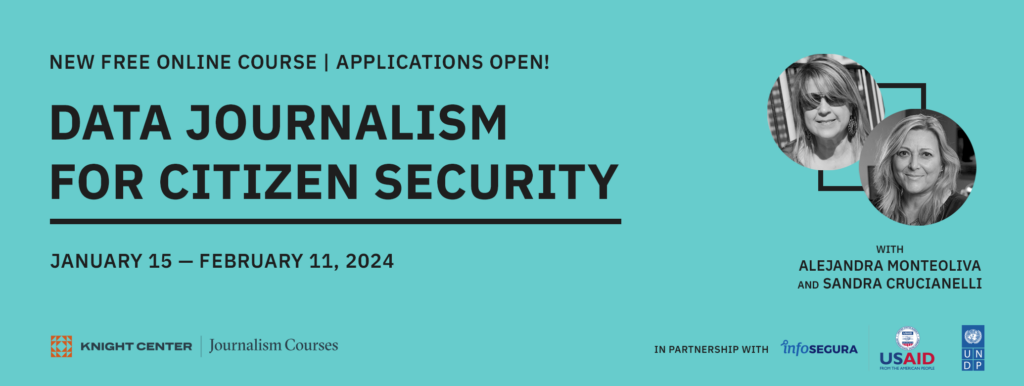Latin America and the Caribbean are among the most violent regions in the world, where crimes reach epidemic levels that create severe implications for the security of citizens and for economic and social development. This has also created challenges for journalists and media outlets interested in improving coverage of citizen security issues.
To help communicators overcome these challenges, the Knight Center for Journalism in the Americas has joined with Infosegura, a regional project of the United Nations Development Program (UNDP), and the U.S. Agency for International Development (USAID) to offer the free online course “Data Journalism for Citizen Security,” from Jan. 15 to Feb. 11, 2024.

This special online training program will be offered simultaneously in Spanish and English for a limited number of participants. Applications are open. Apply today to guarantee your spot!
The course, offered by the Knight Center, in alliance with the UNDP Infosegura Regional Project and the United States Agency for International Development (USAID), is entirely free, and includes a certificate of completion for those who successfully complete course requirements.
The course is designed for journalists, government spokespersons, communicators from citizen security institutions, police, and justice; and others related to citizen security at national and local levels, including members of civil organizations and academics interested in communicating effectively about “citizen security.”
The UNDP understands “citizen security” as the process of establishing, strengthening and protecting democratic coexistence; eliminating threats of violence in the population; and allowing safe and peaceful coexistence.
Apply today for this free course focused on incorporating data journalism into citizen security coverage.
During the course, learn to extract, convert, and process data to report on citizen security and better understand the process of implementing measures to establish and maintain a democratic coexistence, free of threats of violence, that allows the population to live together in a peaceful way.
“The media, journalists and other people in the communications area play an essential role because adequate security communication constitutes a contribution to citizens, not only for knowledge of the problem but also as a mechanism for transparency, for accountability, and ultimately, for social cohesion,” said Marcela Smutt, regional coordinator of the UNDP Infosegura Project.
To be able to participate you have to apply. Only a limited number of students will be accepted. Apply today!
Taught by Sandra Crucianelli, investigative journalist and instructor specialized in digital resources and data journalism, and Alejandra Monteoliva, Infosegura specialist in security, data and information management and criminal analysis, this course is aimed at enhancing and expanding data journalism capabilities on issues related to citizen security in the region.
The course also focuses on strengthening key skills to better understand citizen security, including the generation of evidence for effective policies, the identification of relevant actors and data sources, and comprehensive communication with a focus on gender, intersectionality and youth. In addition, practical skills such as searching and managing data, as well as basic mathematical operations in spreadsheets, are covered.
These skills “can be applied in the different work areas of the participants, whether they are decision makers, technical teams or communicators,” said Monteoliva, one of the two instructors of the course. “Mainly, this course aims to develop and/or strengthen skills for the effective communication of citizen security based on the identification of evidence and the incorporation (use and application) of the same in the decision-making processes and consequently for the dissemination of related information.”
Likewise, Monteoliva emphasized that the course will guide participants to a better understanding of the context of citizen security that will make it easier for them to “generate initiatives, promote changes, within a framework of consensus and/or dialogue.”
Seats are limited. Apply today to secure your spot!
The "Data Journalism for Citizen Security" course will be offered asynchronously, allowing participants to complete the activities at their own pace and at times that are most convenient for them throughout the four weeks.
“It is important to highlight that although the course is self-managed and asynchronous, it is not at any time a 'solo' experience since there is a team of academic professionals (the instructors) and technicians (the platform administrators) to respond at all times to questions, doubts, concerns as well as help resolve situations on the platform that may arise,” Monteoliva said.
To access the course, you will need an Internet connection and tools such as Google Docs, Google Sheets and different browsers will be used. If you do not have a Gmail account, participants can download the files to their computer from the shared links to work offline.
The material is structured in four modules, each taught by Crucianelli and Monteoliva. Each week, a different topic will be explored through video classes, presentations, readings, guest interviews, live office hours (optional), and discussion forums. The evaluation of the knowledge acquired will be carried out through weekly evaluations (quizzes) and active weekly participation in the forums. To obtain a certificate at the end of the course, it will be necessary to successfully complete the requirements of the course.
This MOOC (massive open online course) will include:
Don't miss this opportunity to learn about citizen security and evidence-based communication with experts on the subject! Apply today for this new course.